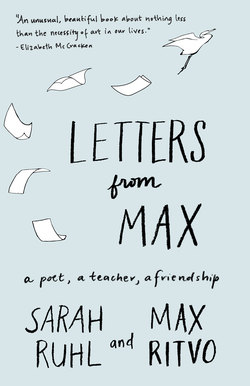Читать книгу Letters from Max - Sarah Ruhl - Страница 20
На сайте Литреса книга снята с продажи.
ОглавлениеThat long winter, amid chemotherapy and scans, Max worked hard to graduate from Yale. His mother stayed with him in New Haven to help him through chemotherapy.
Not only was Max dealing with mortality and school, he was dealing with all the vagaries of college life. Perhaps my empathy was informed by my own experience of college. My father was diagnosed with cancer in the fall of my freshman year, and I lost him a year later. So college was, for me, a bizarre juxtaposition between my own extreme grief and a private, obsessive attempt to get some wisdom from books and teachers. My teachers at Brown University invited me to their homes, and into their lives, and I think that gave me the strength to remain far from home. I lived for my frequent trips from Providence home to Chicago, and somehow survived the indignities of being twenty, surrounded by many drunk young people who were thinking not at all of mortality.
So I imagined that there was a gulf between Max and the young people who surrounded him, who couldn’t quite fathom what he was experiencing. He would write me, asking if we could speak on the phone, saying, “My romantic life is falling apart; I don’t really know how to talk to people about my illness in a nondestructive way, or how they’re supposed to listen, and you write really wonderful listeners.”
Always, always, Max wanted to know what was the best way to listen. Perhaps because I wrote characters who listened to each other, Max suspected that I might be a good listener.
Max came to Dear Elizabeth at Yale Repertory Theater. He hugged me afterward, in tears, and said he felt I’d written the play just for him. And though I hadn’t met Max when I wrote that play, it did feel somehow that I’d written the play just for him.
That winter, we pursued soup. And shared poems.
Max somehow got me to share with him my early poems, written when I was his age. I seldom share my poems with people. Emily Dickinson’s envelope poems are to me the height of beauty—unshared, unfinished, written on envelopes—as partial as they are sublime, as hidden as they are revealed.
My plays get consumed by audiences in front of me; the audiences either laugh or don’t laugh, clap heartily or not at all; the plays get reviewed well or badly; this was as much vulnerability, I’d decided, as one writer could absorb in one lifetime. The poems were private. I wrote them as gifts for other people—occasion poems, you might say, in the old-fashioned tradition. I wanted desperately to be a poet before I discovered playwriting, but once I wrote plays, I began to think there was a kind of equation for playwrights—indifferent-to-bad poets made good playwrights. The poems were a compost heap for the plays. And if you like your friends, you don’t send them compost in the mail.
But Max asked for more poetry, and Max could be very persuasive.
In sharing our poetry with each other, I came to feel less and less Max’s “teacher,” and more his colleague and friend. I was certainly not the only teacher who had a close working relationship with Max. Max spoke often of the astonishing poet Louise Glück, who mentored him beautifully at Yale and afterward. Max would go on to charm scores of teachers who ended up asking for Max’s feedback on their own writing.
That Max turned many of his teachers into colleagues in short order, as fast as you could flip a pancake, was not surprising. The transformation was immediate because it did not take long for a perceptive teacher to see Max as an equal. I was certainly not the only teacher of his to dissolve the formal boundaries between the teacher and the taught. And this reversal was not at all a lack of reverence for his teachers—quite the opposite. He would emphatically introduce me as his Teacher with a capital T long after he was my student at Yale. The transformation of his teachers into fellow writers was more to do with reciprocity.
Max’s generosity could not bear to take without giving, could not bear to be read without also reading. Poetry was, to Max, a conversation. He didn’t want to chirp his epic songs into an unsinging receptacle. He wanted them to answer back. He wanted a poem to answer a poem. He wanted his writing to beget more writing.
He told me that with the time he had left, all he wanted to do was write poetry. He was applying to graduate school in poetry. He asked me for a recommendation. I said yes. I knew it would be very easy for me to write.
